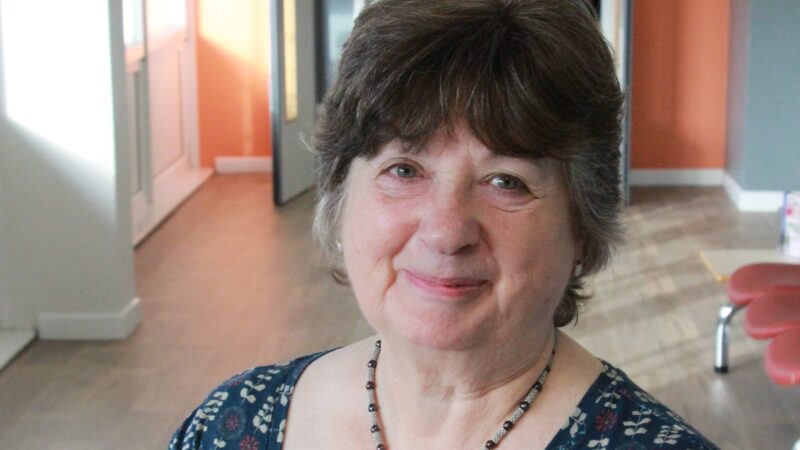
Mary Sayers from Sedgefield is sharing her personal experience with resuscitation decision-making.
“My mum was clear she did not want to be resuscitated – it gave comfort to our family to know.”
The Trust is highlighting the issue of do not attempt cardiopulmonary resuscitation (DNACPR).
DNACPR means if someone’s heart or breathing stops, health professionals will not try to restart it.
Mary’s story
Do not attempt cardiopulmonary resuscitation (DNACPR)
About six or seven years ago my mum was diagnosed with dementia and as part of the beginning process, we were lucky enough to see their team who gave us lots of advice about the future.
And part of that was actually getting your life organised and things like preparing towards the end of life.
So they gave us a sheet about doing your will and organising where you wanted to be in the next few years.
And my mum was very aware of the fact that at some point she would not be able to make decisions for herself and was actually very keen on still being in control of what happened as she got nearer at the end of her life.
And part of that was organising to have a do not resuscitate.
She was adamant that she didn’t ever want to be resuscitated if she got to the point that she wasn’t having a good quality of life anyway and she didn’t want anything that was going to make the quality of her life worse rather than better.
So she actually discussed it with the whole family. And we got all the necessary forms in place and actually doing that and us knowing that whatever happened, if she didn’t have the capacity to make the decisions, we knew what she wanted and that was a comfort as we went through the years.
And we certainly didn’t ever feel that that affected the level of treatment she got.
It was another three years before she actually got to that point where it could possibly have happened but she was treated as normal. But she always, at the times when she did get taken into hospital, she would check with me that I had the form so that she knew that she had that control.
And even though she lost control of other things, it was always in her mind: ‘I need that form because I don’t want to be resuscitated’.
So it was a comfort that that was done early on and actually I think helped us to talk as family more.
It really does not mean that the medical people are going to stop treating you or make different decisions. What it means is that you’re going to be in control and because when you have a do not resuscitate, you can change your mind at any time anyway.
But it means that if you can talk to your family, even about what you feel you would like to happen in those last das of your life.
Then it can be a comfort to you and to your family that you all know what the other person’s wishes are.
“It’s so important we discuss our views”
Mary’s mum, also called Mary, died in January 2019 after suffering with dementia for two and a half years.
When she was diagnosed, staff discussed with Mary about DNACPR at the start of her illness.
It is a decision that her daughter says prevented any unnecessary suffering and gave the family peace of mind.
Mary said: “It is a certainty in life that you will die. It’s so important we discuss our views when it happens.
“It gave comfort to the family, to know mum had made this decision and wouldn’t be put through something she didn’t want.
“The moment mum was diagnosed with dementia she was very keen to put an end of life care plan in place herself so she could control it.
“As a family we felt lucky we had those conversations early on.”
A DNACPR decision is recorded on a special form and kept in a person’s medical records. It is also a patient document which can be kept in their possession.
Mary added: “Having a DNACPR does not mean that you will not get the same care and treatment – mum lived as long as she would have anyway.
“Mum continued to have all the care, treatment and support she would have already had.”
“Our experiences made us more comfortable”
Several members of Mary’s family have the BRCA gene, which increases the risk of cancer for those who have it.
She added: “My older sister died of breast cancer and both myself and my younger sister have had cancer.
“My dad also died of cancer – these experiences have made us more comfortable talking about our wishes at the end of our lives.”
Nearly 20 years ago, Mary was part of a patient group who helped bring a specialist genetics centre to Teesside.
Ever since, she has been actively involved with patient groups at the Trust, including most recently with the end of life steering group and a carer group.
For more information about DNACPRs, please visit the NHS website.